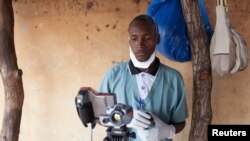Mali became the sixth African country to report a case of Ebola, one week after the U.N.’s health agency warned that more needs to be done to prevent the disease from spreading to other West African nations.
In Bamako, authorities moved swiftly, stepping up measures to reach out to affected communities.
On Friday, schools in the Kayes region where the case was detected remained closed.
Mali reported its first case of Ebola Thursday — a 2-year-old girl. Health authorities have identified family members and others who have been in contact with the girl. The World Health Organization says 43 people are currently under observation. The family travelled with the girl from Kissidougou, Guinea, and she was admitted to a hospital in Kayes in the western part of Mali, close to the border with Guinea.
”Right now, the main thing we should do is to reinforce the surveillance system and try to capture all suspected cases,” says Doctor Samba Sow, who is responsible for the effort to counter Ebola in Mali says contact tracing is key.
All schools in the Kayes region remained closed Friday. In the capital, Bamako, the government stepped up measures to prepare health workers to deal with additional cases. Mali is the only country that has not closed its border with Guinea, the West African country where the first case of Ebola was detected in March this year.
Kayes is a big gold mining area and mine workers, mainly from neighboring Guinea, cross the border on a daily basis.
Dr. Sow says Mali has deployed police along the border to track people's movements, but the porous border means that it is not possible to trace everyone.
“We have teams checking on travelers. There’s no point closing the border as people will cross anyway. In fact there is no border," he said.
A team from the WHO and the U.S. Centers for Disease Control and Prevention (CDC) have just finished a five-day visit to Mali to test the preparedness for Ebola.
Ran Hashing with the CDC says they will work closely with Mali officials.
“The two key areas we would like to support is the ability of the country to identify cases and diagnose them. The second area is to have good contact tracing because case management is very critical,” he said.
WHO sending experts
Friday, the World Health Organization said it will send experts to Mali to reinforce Ebola preparedness after the first confirmed case, reports Reuters.
A WHO team of three experts has been in Mali evaluating its defenses, and at least four more would go there over the next few days, WHO spokeswoman Fadela Chaib said.
"This team is being assembled this morning and will leave for Mali as soon as possible,'' Chaib told a news briefing.
Some information for this report provided by Reuters.




